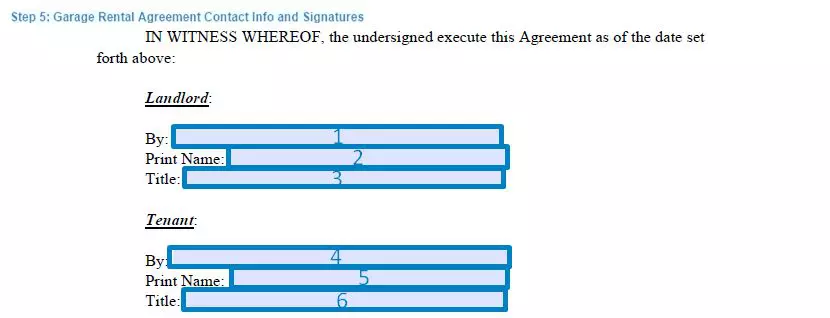Garage Rental Agreement Templates
A garage rental agreement is critical if you’re looking to lease garage space separately from other kinds of property, whether it’s included in a separate lease agreement or completely on its own. Garage lease agreements are needed whether you’re looking for a place to park their car or a place to store some boxes and extra furniture where it won’t get in the way.
Like any rental agreement, these forms need to set out the terms of the lease and work to protect both the landlord and tenant.
Parking Lease Agreement – This document is designed for those seeking to lease or rent our parking space.
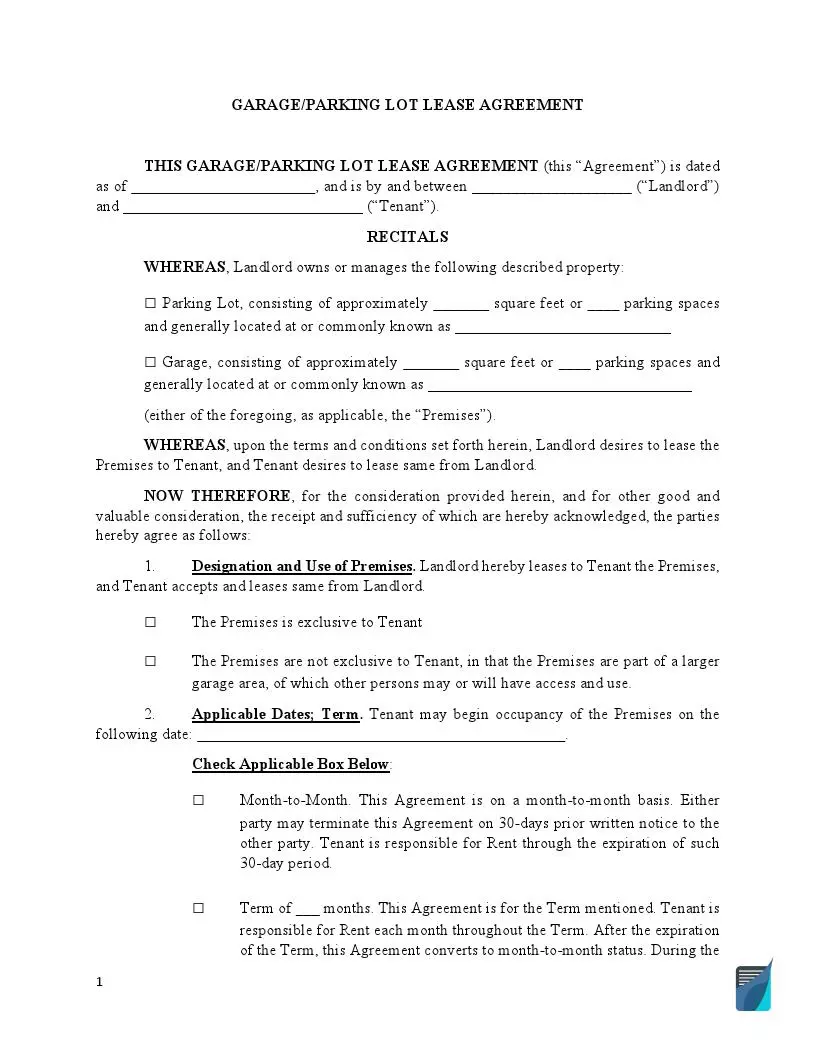
Build Your Document
Answer a few simple questions to make your document in minutes
Save and Print
Save progress and finish on any device, download and print anytime
Sign and Use
Your valid, lawyer-approved document is ready
Why Is It Needed?
A lot of people might wonder why you need a garage lease agreement, after all, it’s just a garage, right? Especially if you’re leasing to a friend or family member and not as a business deal you might not want to deal with the extra paperwork of a written agreement.
But it’s important to make sure you have these leases set out ahead of time, no matter who you’re leasing to.
At the end of the day, commercial lease templates help protect everyone involved with the contract. They also help maintain clear communication and expectations, which reduces the risk that there will be a problem in the first place.
Landlord’s Perspective
One of your primary concerns as a landlord should be with protecting your property and protecting the investment in your property for future use. That means making sure nothing happens that will reduce the value of your property and making sure you have control over how your garage space is used.
Your lease agreement does several things to protect you as a landlord. First, it outlines the terms of the rental and how long the rental will last.
It also allows you to define how the garage will be used. If you’re renting your garage as a parking location, you’ll be able to collect information on the vehicle(s) stored there. You can also add requirements like needing an oil catch on the ground if the car has or develops a leak to protect your investment in the space.
If your garage is going to be used as a storage location, you can use the lease agreement to limit how that storage unit can be used. For instance, you can add a clause that requires that your garage not be used as a living space, workspace, or other functional space for the tenant.
Tenant’s Perspective
Much like a garage rental agreement protects the landlord, it also helps to protect tenants. From the tenant perspective, a good lease agreement helps to define what is expected from you and can help you avoid any fees. Carefully reading your lease terms will tell you how you can use the garage, including what size of vehicle or storage items you’re allowed to keep there.
Your lease agreement also protects your right to use that space for the duration of the lease. If your landlord wants to change tenants or change any of the terms of your lease, they have to approach you and work with you first before they can do that.
Having a good garage lease agreement form will help prevent you from coming back after a long day on the road and discovering that your garage is already being used by someone else.
How to Rent Out a Garage?
If you’re not using your garage renting it out can be a surprisingly good way to get a little more money out of your property. There are a few steps you should take before renting to protect you, your future tenant, and to attract better tenants in the first place.
Clean the garage

Before you even go out to list your garage as available for rent, the first thing you need to do is clean your garage. Make sure you don’t have too much of your stuff laying around, and that the floor and walls are clean.
Take photos

Next, take some photos of your garage to include with the listing. Consider hiring a professional photographer so you can present your garage in the best possible light.
Prepare the terms

Last, before you list the garage you need to decide on the terms of the agreement. You should have the rental amount, exact location, and how much space is available, and any other included features or tenant requirements worked out ahead of time.
Advertise
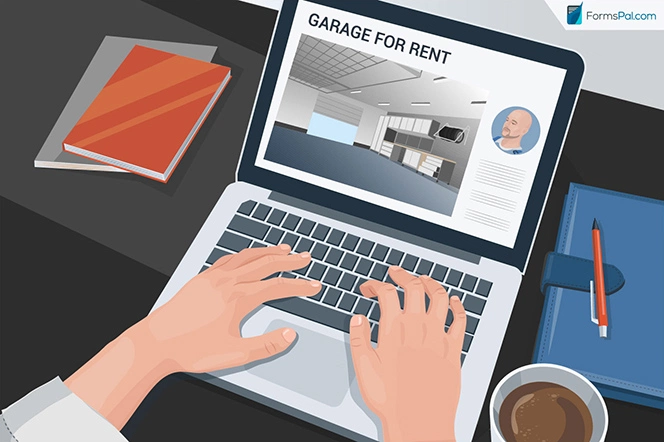
Next, you’ll want to list your garage on local rental sites, in your neighborhood newsletter or newspaper, and on relevant social media postings. When you have an interested tenant, talk with them before signing the agreement and let them move in once you’ve got the agreement ready to go.
Garage Rental Agreement Form Details
| Document Name | Garage Rental Agreement Form |
| Other Names | Garage Storage Lease Agreement, Parking Garage Lease |
| Avg. Time to Fill Out | 10 minutes |
| # of Fillable Fields | 45 |
| Available Formats | Adobe PDF |
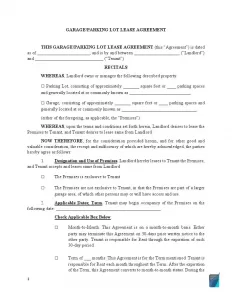
Filling Out a Garage Rental Agreement Template
Step 1: Fill Out Personal and Garage Information
The first thing you’ll need to fill out is the full legal name of both the landlord and the tenant. You’ll also need to write out the address of the garage, and its full square footage. If you’re renting a parking space or several parking spaces, you should also include those details about the exact space that’s being rented.
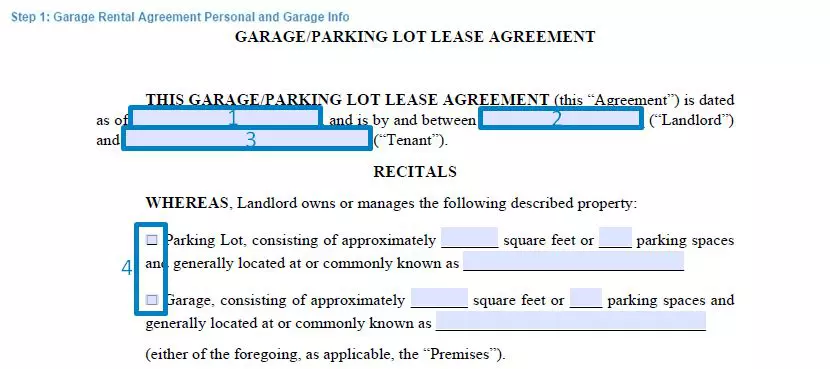
Step 2: Terms and Designation of Use
The terms and designation of use is where the landlord can limit and define the use for the space. So, for instance, limiting the use of the space to the tenant and only the tenant. The terms will also include the effective date of the rental, and how long the rental will last.
For instance, you may want to rent month to month, or you may want a longer 3, 6, or 12-month lease period.

Step 3: Use Requirements
The use requirements section allows the landlord to further limit and define how the garage or parking space can be used. So, in the case of a parking lot, the landlord can demand that the space be used only to store a vehicle, it can’t be used to store furniture or other goods.
This is also the section where your landlord will decide whether vehicle repairs and inspections can happen in their garage and any other limitations.

Step 4: Rent Agreement and Disclaimers
Finally, if you agree to all of the terms that have been outlined in the previous sections, this part of the garage rental agreement form will cover the cost of the rental and when rent will be due each month. If your landlord is asking for a security deposit, this is where it will be.
This section will also cover the additional legal disclaimers that protect both the tenant and the landlord.

Step 5: Contact Information and Contract Signatures
The last section of the agreement is the contact information and signatures. Both the tenants and the landlord will need to sign and date the agreement. You may also need to get this document witnessed or notarized depending on your landlord and the other terms of the agreement.
